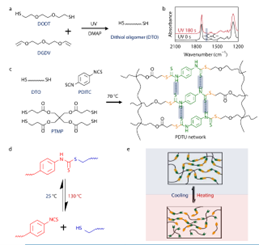Plastic pollution fighter: self-recycling polymers emerge

Monomers and the schematic illustration of bond exchange in the polydithiourethane network.
GA, UNITED STATES, January 13, 2025 /EINPresswire.com/ -- A cutting-edge study has unveiled a revolutionary class of aromatic polydithiourethanes (PDTUs1) that could redefine sustainable plastics. Unlike traditional materials, these polymers can be reprocessed without compromising their mechanical strength—overcoming one of the most significant hurdles in plastic recycling. This breakthrough marks a significant advance in integrating dynamic covalent bonds into thermoset materials, offering a compelling path toward high-performance, recyclable plastics that meet the growing demand for environmentally friendly solutions.
Synthetic polymers are both a marvel and a menace, offering unparalleled utility but wreaking havoc on the environment. Traditional thermosets, prized for their durability, are notoriously difficult to recycle due to their permanently crosslinked structure, contributing to mounting landfill waste. This stark reality has intensified the search for alternatives that combine recyclability with high performance, a challenge that sits at the heart of the global push for a circular economy.
In a study (DOI: 10.1007/s10118-024-3166-9) published on August 9, 2024, in the Chinese Journal of Polymer Science, researchers from Zhejiang University announced a game-changing approach to sustainable polymers. The team has developed catalyst-free aromatic polydithiourethanes (PDTUs), offering a practical and scalable solution to the environmental crisis posed by traditional plastics.
The study focuses on the synthesis and properties of PDTUs, a novel polymer class leveraging aromatic dithiocarbamate linkages—dynamic covalent bonds with extraordinary adaptability. These bonds allow the polymer network to dissociate and reassemble under mild conditions without any catalyst, enabling efficient recycling while retaining their mechanical properties. Extensive testing demonstrated that PDTUs possess high gel fractions and withstand rigorous thermal and mechanical stress, ensuring durability in real-world applications. Furthermore, the research provides detailed insights into the mechanisms behind bond dissociation and network reconfiguration, underscoring the material's robustness and transformative potential for the plastics industry.
Dr. Ning Zheng, the study’s principal investigator, highlights the innovation's significance: “Our work on aromatic PDTUs represents a significant milestone in sustainable polymer science. By harnessing the inherent dynamism of dithiocarbamate bonds, we;ve created polymers that can self-recycle without sacrificing performance. This represents a vital step toward next-generation plastics that significantly reduce environmental impact while maintaining utility.”
The implications of this research extend far beyond the lab. The self-recycling capabilities of PDTUs could transform the plastics industry, reducing reliance on single-use materials and mitigating plastic waste's environmental toll. From consumer goods to industrial applications, these polymers promise a more sustainable future by aligning high performance with circular economy principles—charting a course for an era where plastics can be both durable and eco-conscious.
DOI
10.1007/s10118-024-3166-9
Original Source URL
https://doi.org/10.1007/s10118-024-3166-9
Funding information
This work was financially supported by the National Natural Science Foundation of China (Nos. 22275162 and 52322307).
Lucy Wang
BioDesign Research
email us here
1 https://doi.org/10.1007/s10118-024-3166-9
